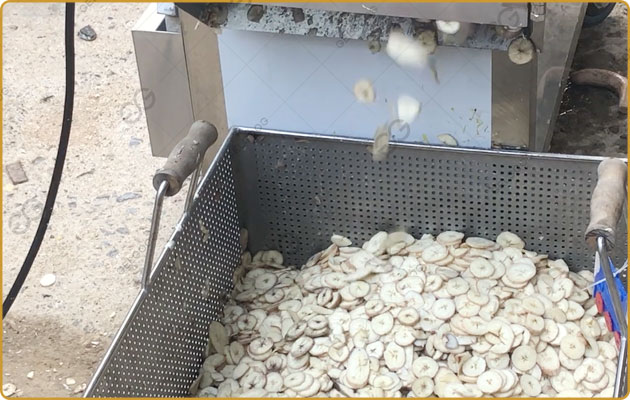When it comes to slicing plantains, the traditional method of cutting with a sharp kitchen knife is often time-consuming, laborious, and prone to injury. Farmers and small-scale producers face challenges such as inconsistent slice sizes and low production efficiency. To address these issues, mechanized plantain slicers emerged and changed the industry landscape. Let’s explore the types of machines used for this purpose.
- Mechanized slicers: a modern solution
Mechanized plantain slicers are designed to automate the slicing process and significantly reduce manual labor. These machines typically use a shear-cutting principle, with a rotating blade cutting the plantain into uniform slices. For example, a rotary slicer (such as the one described in and ) can slice a plantain in 2-3 seconds, while using a traditional knife would take 40-80 seconds. This efficiency is achieved through a crank-slider mechanism driven by an electric motor, which ensures precise and consistent cutting.
- Key features of modern slicers
Hygienic and durable: Many machines use stainless steel components to ensure food safety and easy cleaning.
Adjustable thickness: Most slicers allow users to adjust the slice thickness (e.g. 2-6 mm) to suit different recipes or market demands.
Low maintenance: Simple designs like the single pulley drive machine (produced by) require little maintenance and are ideal for small-scale production.
Scalability: Some models, such as the HDF-S01 (produced by), are designed for industrial use and can process 500 kg of raw plantains per hour.
- Machine types
Specialized models: Industrial machines like the banana slicer machine integrate multiple processes—slicing, blanching, frying—to simplify the production of plantain chips.

- Advantages over traditional methods
Mechanized slicers eliminate the risk of finger injuries, ensure uniform banana chip sizes, and increase production efficiency. For example, compared to 40-80 seconds for knife-cut banana chips, mechanized slicers take only 5-7 seconds, reducing heavy labor and increasing yields. These machines also enable large-scale production for local and international markets, in line with the goal of reducing post-harvest losses.
Conclusion
Whether you are a small-scale farmer or a commercial processor, the right plantain chipper can transform your workflow. From simple electric models to industrial-grade systems, these tools are precise, efficient and scalable. As the study highlights, adopting mechanized solutions can not only increase productivity, but also support sustainable food security.